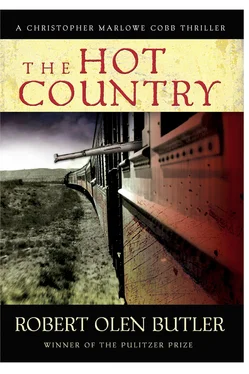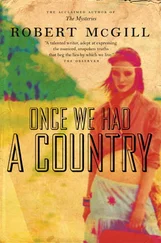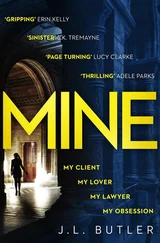The knife fell from his hand. But my hands, my whole body, roared on. I twisted hard at the arm, twisted it even farther across his back, I put my foot against his right shoulder blade and I wrenched at the arm and felt it give way at the socket.
I heard screaming. Distant screaming.
I stopped. I was on both my feet. He was down against the ground.
I heard screaming. Nearby now. Very loud. Krüger was screaming.
I looked at his arm. I’d let it go. It was lying nearly flat across his back.
I looked down along his body and I saw his right leg splayed out from under him, the angle all wrong at the knee.
I was breathing fast and heavy and it was like I wasn’t breathing at all, my lungs felt utterly empty, and I slowed it down, slowed it all down. I thought about what this all was. I started to actually feel the air I was drawing into me. I was breathing. I was slowing down.
I could hear Krüger struggling to control the screaming, struggling to be a man, though the low sobbing moan that abruptly took over for the scream must have embarrassed him just as much.
I turned to Diego, who was pressed back against the warehouse wall. His eyes were wide.
“Are you okay?” I managed to say, though my voice was thin and soft.
He nodded yes.
Krüger had gone quiet. I looked down at him. He was lying face forward, his head turned to the side, his face pressed against the dirt, his mouth gaping. I thought he’d passed out from the pain. But his lips seemed to be trying to move and he was starting to moan again.
He’d chosen this.
Diego and I had to go.
But before we did, I had to understand for certain what my instincts had told me a short time ago.
I leaned down and grabbed Krüger’s torso and I tried to turn him over onto his back. He moaned loud as he turned, and his arm stayed twisted and vanished beneath him, keeping him from going flat, but I could see his dark shirtfront. I clearly made out a darker, faintly glistening stain there, a great dark stain splashed upon his chest. Krüger had known that he would be covered in Gerhard’s blood and that his dark clothes would hide the stains for his return to the consulate.
I looked back to Diego. He had not moved. His eyes were not quite so wide now, but he was still frozen there.
I took a step toward him. My legs were unsteady. But I focused. I took another step.
And for a moment Diego pulled away from me. Ever so slightly. But I could see his shoulders go back, his face tighten, his eyes freeze.
It made no difference that my violence was in his defense. For one terrible moment — as terrible for me as for him — I was his papi coming for him.
I stopped. And the moment flickered and passed. The moment passed. He was looking at me again, not at his father. He knew it was me again.
“You sure you’re all right?” I said.
“Yes,” he said.
“You caught him outside, coming back to the consulate,” I said, more a statement than a question, though Diego understood that I was asking.
He nodded yes.
“You tried to hit him up for a reward for finding the wallet.”
He nodded yes.
“Will you ever learn to do what I say?”
He nodded yes.
We just looked at each other. For one breath, and another.
Then I said, “Thanks for the stone.” He’d probably saved my life. And he could not have known that I’d thrown one only a few moments before.
Diego said, “David and Goliath. I am a good Catholic son.”
I turned back to Krüger. He murdered Gerhard. I had no doubt. I thought to kill him. Right now. Take his own knife, which was lying a few feet away, and do the justice that, in this time and place and circumstance and considering the victim’s secrets and the killer’s diplomatic status, I knew would not be done.
The part of me that sounded so reasonable making this case but raged wildly beneath, that part wanted to do this thing, wanted to kill this son of a Prussian whore. But the other part of me that trembled now in muscle and nerve from what I’d done so far and yet was calm beneath, that part wanted me to live my life the way I’d always lived it, at observant peace amid war, watching, writing, taking care. Gerhard and Krüger could eventually come to justice through my printed words. Let God be God; I’d be Christopher Marlowe Cobb.
I knew I was being watched. Not from heaven. From a few feet away.
I turned again to Diego. My high-energy little street punk was still pressed against the warehouse wall, had still barely moved a muscle. His eyes had grown wide again, as if he knew what I was considering.
Krüger was beginning to moan once more. I turned back to him. I took a step. Diego gasped a little. I did not stop. I would not kill Krüger, but if he was going to live, then he had to understand.
I stood over him. He was still partly on his back. His eyes fluttered open now. I bent near his face. His eyes closed and then opened, not in a flutter but in a single, waking gesture. I waited. I waited for his eyes to fix on me.
I watched something surge silently in him. He cut off a moan. He was fully conscious. He knew who was before him.
I said, “The next time I see you.” And I paused to let it sink in. His eyes focused, flared. “The next time,” I said, “I will kill you.” And I meant it.
I straightened up. I turned to Diego. I gave him a snap of the head toward the light at the far end of the corridor between the warehouses and he was off at once, at a run, and I was following him.
Diego led me to a tiny, cobbled-together hovel — once fully adobe but now el Norte- ravaged and patched with smears of cement, a panel of scrounged wood, a rusted sheet of tin. I could hear a woman’s voice — a sweetly wavery woman’s voice — singing within. I looked at Diego, who heard this too, and he shot me a brow-furrowed glance. His mother. He was embarrassed.
“It’s good,” I said, meaning something that Diego surely didn’t get. This neighborhood of hovels was piled everywhere with great heaps of long-rotting garbage. The smell was a different kind of putrid but just about as intense as the next-afternoon smell of untouched carnage on a Nicaraguan battlefield, and the slop beneath our feet had run straight from the waste buckets of these households. But she sang. I was instantly sure that some of the good I saw in Diego was due to his mother singing in the midst of all this, and my little chulo callejero didn’t get it. Maybe he would someday.
She sang that her lover should not give the mole next to his lip to anyone’s mouth but hers and she moved into the refrain: Ay, ay, ay, ay, Canta y no llores, Porque cantando se alegran, Cielito lindo, los corazónes. Sing and don’t cry, was the message. Singing gladdens the heart.
Diego flung up the palm of his hand at me and darted ahead through his door and out of sight. I stopped and waited. All right. Not quite the verse of the song he might have liked me to hear from his mother. There was singing and there was singing. And I thought of my mother singing in Storyville, and I preferred to just take a deep breath of this neighborhood and clear my head of that.
The singing stopped. The hut was quiet. Diego appeared in the doorway and motioned for me to enter. It struck me now: He never questioned that he would bring me along to where he lived. We didn’t say a word about it, but after he and I, together, lived through the moment when he was to be knifed to death as a child, after we caught that particle of time and deflected it elsewhere, this was where we needed to go. Together.
I moved to the door and I stepped in. His mother was sitting cross-legged on a rush mat in the center of the floor, a dark shirt I recognized as Diego’s crumpled in her lap, a needle and thread placed upon it so she could receive me. The walls of the one room were bare and there were half a dozen sleeping mats around the edges of the floor, one with about a six-year-old girl, cornstalk-thin, asleep on her side, one with a half-naked toddler boy who looked like he was on the verge of tears but did not make a sound, one with a chicken picking at it, having wandered in through the open back door, where I could see other dwellings like this one arranged around a common ground with a stone washtub and pump in the middle.
Читать дальше












